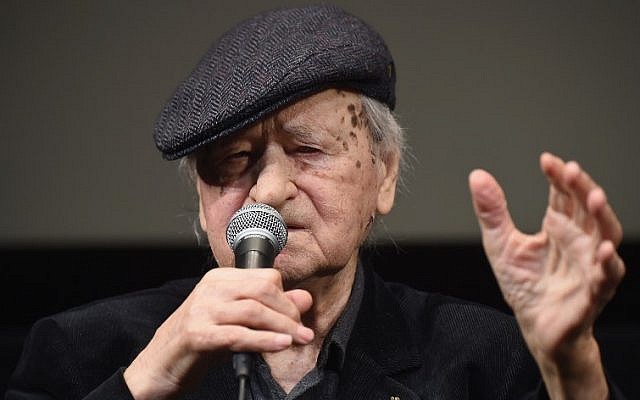
 |
‘Godfather’ of American Avant-Garde Film, Is Dead |
Post Reply 
|
| Author | |
snobb 
Forum Admin Group 

Site Admin Joined: 22 Dec 2010 Location: Vilnius Status: Offline Points: 30571 |
 Post Options Post Options
 Thanks(0) Thanks(0)
 Quote Quote  Reply Reply
 Topic: ‘Godfather’ of American Avant-Garde Film, Is Dead Topic: ‘Godfather’ of American Avant-Garde Film, Is DeadPosted: 24 Jan 2019 at 12:14pm |
Jonas Mekas, ‘Godfather’ of American Avant-Garde Film, Is Dead at 96 Jonas Mekas, a filmmaker, curator, archivist, critic and all-around evangelist for independently made movies in general, and for those variously known as experimental, underground or avant-garde in particular, died on Wednesday at his home in Brooklyn. He was 96. His son, Sebastian, confirmed the death. It is rare to have consensus on the pre-eminence of any person in the arts. But few would argue that Mr. Mekas, who was often called the godfather or the guru of the New American Cinema — his name for the underground film movement of the 1950s and ’60s — was the leading champion of the kind of film that doesn’t show at the multiplex. A Lithuanian immigrant who, with a younger brother, Adolfas, arrived in New York City in 1949 speaking little English, he became within a handful of years an effective spokesman for avant-garde film. (Adolfas, who died in 2011, became an influential filmmaker, writer and educator in his own right.) In addition to making his own movies and writing prolifically about the movies of others, Mr. Mekas was the founder or a co-founder of institutions that support and promote independent filmmakers, including, in New York, the influential journal Film Culture, published quarterly from 1955 to 1996; Film-Makers Cooperative, a distribution network; and Anthology Film Archives, the leading library and museum for experimental film. (The critic Andrew Sarris published his influential essay on the auteur theory in Film Culture.) Part intellectual, part enthusiast, part provocateur, Mr. Mekas could always be counted on to sound off on behalf of experimental films, work that could be visually rich and narrative poor, startling or even shocking in imagery, patience-testing in pace and coherence, and taboo-testing in subject matter. Beginning in 1958, he wrote a column, Movie Journal, for The Village Voice, then in its infancy as an alternative newspaper. He continued to write it until 1975. Essentially The Voice’s first film critic, he reliably excoriated such popular Hollywood fare as “A Raisin in the Sun” and “Anatomy of a Murder” and extolled the work of underground filmmakers like Stan Brakhage, Kenneth Anger, Bruce Baillie and Jack Smith. In 1963, Mr. Mekas was arrested on obscenity charges for screening Mr. Smith’s “Flaming Creatures,” a voyeuristic and surrealistic film featuring hermaphrodites, cross-dressers and other gender-ambiguous characters. “I can’t understand why people prefer the grossness and banality of a Hollywood or a European Art movie, as against the illuminations and ecstasies of an Avant-garde Film,” Mr. Mekas wrote in an essay in The New York Times in 1969. “The Hollywood film deals with gross, simplified realities, banalized feelings, ideas, thoughts. The Avant-garde Film deals with the subtler nuances of experience, emotions, ideas, perceptions — it illuminates them — it deals with things that make you finer. “I do not understand,” he continued, “by what logic the public, film critics and educators choose to spend thousands of hours of their lives with second-rate art, while at the same time making fun of the Avant-garde Film.” An Occupied CountryJonas Mekas (commonly pronounced JOE-nass MEEK-us, though his son said it was pronounced YO-nus MAC-us in Lithuanian) was born in late December 1922 in the Lithuanian village of Semeniskiai. He was 16 when World War II started, and Lithuania was soon occupied — first by the Russians, who engaged in mass deportations of Lithuanians to Siberia, and then by the Germans, who wiped out almost all of the country’s Jewish population, often helped by Lithuanians who saw Jews as Communist traitors. Inclined to subversiveness from an early age, Mr. Mekas worked for an underground newspaper published in Birzai, a northern Lithuanian city. He later said that the newspaper, The New Birzai News, had needled both regimes. But in an article in The New York Review of Books in 2018, Michael Casper wrote that the paper, founded by an ultranationalist underground group, the Lithuanian Activist Front, was more favorably inclined toward the Germans and rife with anti-Semitic polemics. But he added: “Unlike other members of his activist circle, Mekas was not an anti-Semitic polemicist. His own writings for the NBZ were book reviews, literary essays, and poems that espoused a romantic nationalism. None of his writings is anti-Semitic.” Ms. Mekas wrote that he had resisted and tried to flee the Nazis and that, along with his brother, he was sent by the Germans to a labor camp. Interviewed by the critic and director Peter Bogdanovich in 2015 for Interview magazine, he said: “When the Germans came in, I joined other young people in the resistance. My function was to do the typing for the underground newspaper. It was against the Germans and the Soviets.” When the war ended, Mr. Mekas and his brother lived in a camp for displaced persons in Wiesbaden. From the camp, Jonas was able to attend the University of Mainz, where he studied philosophy and wrote poems. In an interview with The New York Times Magazine in 1965, he said it was reading a book called “Dramaturgy of Films” that changed the course of his life. “The book opened our eyes,” he said about himself and his brother. “We had continued to write in Lithuanian — I poetry, Adolfas prose — but we felt lost outside Lithuania. We needed an audience. Language begins to die unless one cultivates it. When I read the book, I realized that, no matter where we went, cinema was the tongue in which we could reach anybody.” The brothers were sent to the United States by the International Refugee Organization and were headed to Chicago, where work awaited them in a bakery. But when they landed in New York, they were so mesmerized that they couldn’t leave. Settling in Williamsburg, Brooklyn, they worked odd jobs — loading trucks, washing dishes — and immersed themselves in the city’s teeming and rebellious arts scene, soaking up painting, literature and music but especially film. “We were dry sponges!” Jonas Mekas once said. Within weeks they had bought a Bolex movie camera, and Jonas began shooting scenes of his daily life — film diaries, so to speak — a practice he would continue for much of the rest of his life in a monumental autobiographical project that also included numerous short videos and written works: a dream journal, collections of anecdotes, volumes of diaries, a dozen books of poetry and more. Moving to Manhattan in 1952, he got a job as a messenger for a photo studio and began learning the intricacies of photography, darkroom technique and filmmaking. The next year he began exhibiting experimental films at a gallery on the Lower East Side, and by 1955 he and Adolfas had founded Film Culture. An Answer to the FrenchWith contributors like the psychologist and cultural scholar Rudolf Arnheim, Mr. Sarris and, later, Mr. Bogdanovich, Film Culture established itself as an answer to the seminal French journal Cahiers du Cinéma. Film Culture, perhaps the first American publication to consider film as both a legitimate art form and an influence on the larger culture, lasted into the 1990s. And though its original focus was at least as much on mainstream as experimental movies, by the mid-1960s it had become an important clearinghouse for ideas about avant-garde cinematic art. By the early 1960s, some underground films — including John Cassavetes’s “Shadows,” Robert Frank and Alfred Leslie’s “Pull My Daisy” and Shirley Clarke’s “The Connection” — had gained enough notoriety that Mr. Mekas felt it time to declare that a movement, the New American Cinema, was afoot. In 1962, he and some 20 other filmmakers began the Film-Makers’ Cooperative. They announced its existence with a manifesto that called mainstream cinema “morally corrupt, aesthetically obsolete, thematically superficial, temperamentally boring”; rejected censorship of any kind; and denounced what it called “the Budget Myth.” In 1964, Jonas and Adolfas made “The Brig,” a filmed version of Kenneth Brown’s play about a Marine Corps prison as staged by the Living Theater. Since then his best-known films have been highly personal documentaries, including “Lost, Lost, Lost” (1976) and “As I Was Moving Ahead I Saw Occasional Glimpses of Beauty” (2000); these films made use of spliced-together film-diary footage he had shot over many years. Another, “Reminiscences of a Journey to Lithuania” (1972), told the story of his first visit home, accompanied by Adolfas, who made his own film of their journey, “Going Home.” When the two films were shown together at the New York Film Festival, Vincent Canby of The Times wrote that the evening was “rather more brimful of Mekases than one might ordinarily seek out, yet it’s also successively moving, indulgent, beautiful, poetic, banal, repetitious and bravely, heedlessly personal.” In recent years Mr. Mekas was a subject of a series of articles in The Times called “85 and Up,” in which the reporter John Leland followed a group of elderly New Yorkers as they navigated the upper end of old age in the city. Last year, Mr. Mekas was the subject of a documentary, “I Had Nowhere to Go,” by the Scottish artist and filmmaker Douglas Gordon. The title is the same as that of a volume of Mr. Mekas’s published diaries. Mr. Mekas’s marriage to Hollis Melton in the early 1970s ended in divorce in the early 2000s, his son said. In addition to his son, Mr. Mekas is survived by a daughter, Oona Mekas, and a granddaughter. “There is no formula,” Mr. Mekas said in 2010 when asked to define the avant-garde. He added: “The avant-garde is always the front line in any field. In science, in music, where somebody just comes in, moving ahead into some totally unknown area, the future, and doing something not so much that people aren’t used to, but going maybe to different content, using different techniques, different technology. “That’s the avant-garde to me,” he continued. “That’s where usually it’s all very fragile, and on the front line is where usually most of the bullets hit you. Most of the attacks are directed against the front line. It’s that area that I felt needed somebody who would defend it from all those critics and those attacks. So that was my function, to try to help those very fragile new developments.” from www.nytimes.com Edited by snobb - 24 Jan 2019 at 12:24pm |
|
 |
|
Post Reply 
|
|
|
Tweet
|
| Forum Jump | Forum Permissions  You cannot post new topics in this forum You cannot reply to topics in this forum You cannot delete your posts in this forum You cannot edit your posts in this forum You cannot create polls in this forum You cannot vote in polls in this forum |